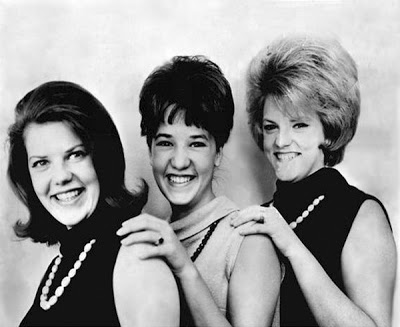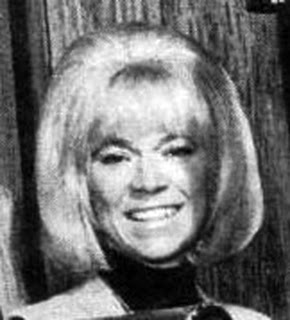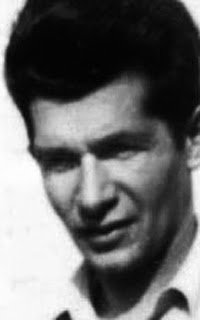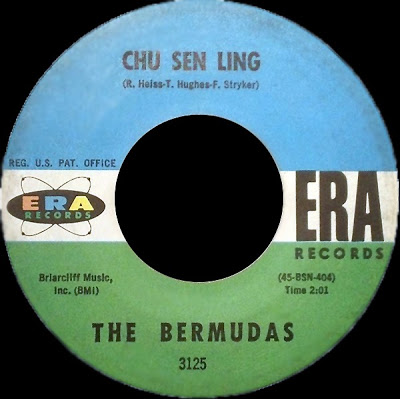The Bermudas were the three daughters of a singer-songwriter known back then as Rickie Page. Rickie was married to another singer-songwriter and record producer named George Motola. The story gets a bit complicated, so let’s go through the cast of characters one by one.
Rickie Page was born June Evelyn Kuykendall in tiny Lindsay, Oklahoma on 7 November 1929. Her father was Charles Herman Kuykendall, but folks always called him Herman. Herman married Ovella Joy Webb on 3 October 1925. He was 18 and she was 17 at the time, and both were from rural Oklahoma. After losing their first child, the couple had five more children, Ray, June, Noah, Sonya, and Susan. June’s mother passed away in 1988 and her father followed in 1996, and both had been living in Fresno, California.
Young June began singing as soon as she could talk. It was during the depression, so the family couldn’t afford records. They’d listen to the radio and June would sing along, accompanied by her father. The whole family would get together often for hoe downs where it seemed everyone could either sing, play some instrument, or both. June grew to love classical music, but her dad wasn’t all that fond of it. The family moved to Fresno while June was growing up. She had dreams of becoming a songwriter, which led her to leave home for Hollywood in search of fame and fortune with nothing in her pocket but ten dollars cash.
She took a job waiting tables at a Jewish deli that was popular with folks in the music business at the time. It was there, in 1956, that June served a milkshake to a guy who gave her a five dollar tip and then asked the hostess about her. The guy’s name was George Motola, but folks always called him Buddy. After hearing about June’s aspirations as a songwriter, he invited her up to his office for an interview. “Yeah, right, interview,” she must have thought, because she never went. But George was persistent. Later that week he went back to the deli and asked her why she didn’t show up. Still suspicious, she asked a friend to accompany her and she went to George’s office. She was a bit surprised when she found that George worked in the same office with Jerry Lieber and Mike Stoller, who were writing material for the Coasters and working on the music for Elvis Presley’s movie, Jailhouse Rock! June played some of her compositions for George, but he wasn’t very interested in them. Instead, he liked June’s voice. He wanted her to become a singing star! June decided to pick a stage name that sounded youthful, and she came up with Rickie Page, but we’re going to keep calling her June here.
George Motola was born on 15 November 1919 in Hartford, Connecticut. His parents had immigrated to the United States from Italy and had five boys. He started out as a used car dealer! Music was his true calling, so George found himself working at Modern Records in Los Angeles by the mid 1950’s, supervising acts like Jesse Belvin, Young Jessie, Jimmy Beasley and many others.
George formed a group called The Shields with the sole purpose of covering the song You Cheated by The Slades for his own Tender label. The Shields included Frankie Ervin (lead singer), Jesse Belvin, and Johnny ‘Guitar’ Watson. George sold the song to Randy Wood who released it nationally on Dot Records. It became a bigger hit than the Slades version, which was probably the first time a black group covered a white group’s song and turned it into a bigger hit on the pop charts.
In 1960, George produced one of the wildest recordings ever made, a frantic song called Rockin’ This Joint Tonight by Kid Thomas. George was too busy to do anything with the record, so he hooked Kid up with the owner of the TRC label, Brad Atwood. Kid, whose real name was Tommy Louis, was all set to appear on television to promote his record when Brad Atwood got into some unspecified trouble and his company went down the drain.
June and George also ran their own record label, Troy Records, and put out several singles throughout 1963.
George wrote or co-wrote approximately 120 songs during his career. Most of his co-writing was done with his wife, June. One of the many songs they wrote together was Johnny Johnny Johnny for the G Notes in 1958. All vocals on that song were done by June, with Eddie Cochran sitting in and playing guitar on the session. He loved the song and asked permission to record it. He did, changing the name to Jeannie Jeannie Jeannie and it squeaked up to #94 on the charts in America, but made it all the way to #31 in England. The G Notes were three sisters, 12 year old Linda, 10 year old Nancy, and 3 year old Coleen. Their father, Sam Gino, built a recording studio for them in his home in Thousand Oaks, California. June discovered these kids while watching them perform on an amateur show and brought them to George’s attention. They also recorded as the Gino Sisters.
June became a recording star with releases on Liberty, Dot, Zephyr, and Rendezvous. Sometimes recording with her sister Sonya, and sometimes with some combination of her three daughters, June also put records out on Con, Landa, Decca, Epic, Era, Fleet, Hit, Landa, Spar, United Artists, and VIP, using a huge variety of artist names, including The Georgettes, The Bermudas, Joanne And The Triangles, The Majorettes, Beverly And The Motorscooters, Becky And The Lollipops, June And Joy, and The Page Sisters. She had several solo releases under the name Rickie Page, Ricky Page, and even Ricki Page.
The Georgettes were named after George. The vocals were done by June with help from a girl from the Philippines named Rosalie. They hired someone to take their place when performing the songs live. Things get complicated when you try to research this group because there were at least two other groups using the same name. Those other groups recorded on the Sabre, Goldisc, and Hit labels.
Both the Page Sisters and June And Joy were June with her sister Sonya. Later, Sonya quit, leaving June to search for a replacement. She considered using her other sister, Susan, but she was too young at the time.
Becky And The Lollipops were June’s two older daughters, Rebecca and Joanne.
June also worked with many other artists and producers over the years, including Darlene Love and Phil Spector, The Blossoms, The Righteous Brothers, Sonny And Cher. She became a session singer too, laying down backing vocals behind The Blossoms and Eddie Cochran on a couple records.
Today’s New Oldie was one of the many “family” records that June put together. The song was probably recorded by June herself, with help from her two older daughters, 15 year old Sheila and 14 year old Joanna. However, when the song was promoted on television, they would replace June with her youngest daughter, Becky, who was just twelve years old at the time. They called themselves the Bermudas, and they had a #62 chart hit in April 1964 with a song called Donnie. This was the only record by June, with or without her family members, to make a dent in the charts. But, it’s on the flip side of that record that we find the following hidden gem.
Here’s Chu Sen Ling by The Bermudas on Era 3125 from 1964:
Here’s a video clip of The Bermudas doing a lip-sync to Donnie for Dick Clark, also known as the Ryan Seacreast of the 1950’s and 1960’s.
In September 1965, after working together in Hollywood for almost nine years, George and June moved to Nashville and hooked up with producer Billy Sherrill. June recorded four tracks under Billy’s direction, two of which were released on Epic in October 1965. In 1968, she did a budget cover of Jeannie C Riley’s Harper Valley PTA on Spar 301 which managed to get a lot of local airplay in Seattle and Vancouver. She released one more single on Decca 35242 in 1969, Why Why Why b/w You Don’t Know What A Friend Is Made For. June became a member of The Nashville Edition, singing with the Jordanaires, and appearing regularly on the Hee-Haw television show.
When George Motola died on 15 February 1991, his friends, business associates, and family chartered a boat to scatter his ashes at sea while Gretchen Christopher of The Fleetwoods sang his greatest hit record, Goodnight My Love (Pleasant Dreams), a cappella. That song was a #7 R&B hit for Jesse Belvin in December 1956, with a “white” cover by The McGuire Sisters reaching #32 on the Billboard Hot 100 simultaneously. It became a hit again in November 1959 for Ray Peterson. It was a #32 hit in June 1963 for The Fleetwoods. Ben E King’s version peaked at #91 in January 1966. It popped up the charts again in 1969, reaching #27 for Paul Anka. There are at least a couple dozen cover versions of this song playing in the rotation on MusicMaster Oldies. Paula Abdul even had a hit with the song in 1991, but we don’t play that one. George had just finished producing the song with Jesse Belvin when he met June back in 1956. That version became the closing theme for Alan Freed’s radio show. There are at least four other songs with that same name, making my research efforts even more complicated!
What you may not know about the song Goodnight Sweetheart is that George Motola didn’t actually write the whole thing. He started it, but he never finished it. Instead, Jesse Belvin provided the lines for the bridge to complete the lyrics. Jesse asked for $400 in lieu of co-composer credits, but George didn’t have that much money handy. Instead, he asked a friend, John Marascalco, to put up the money for him. That’s why John’s name appears with George’s on these records! You may also be interested to know that the piano player on the Jesse Belvin record was only 11 years old at the time. His name was Barry White. Yup, THAT Barry White – and now you know the rest of the story!




